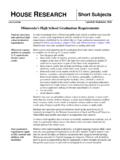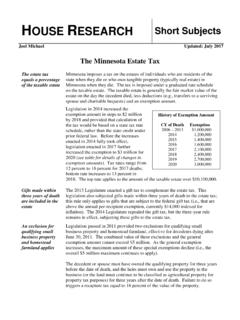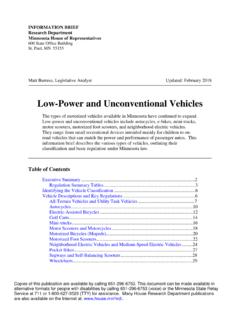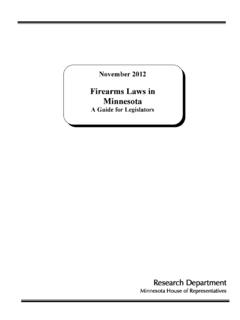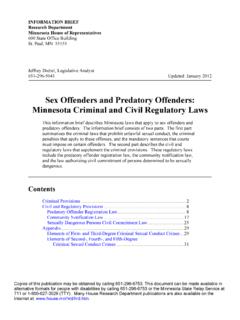Transcription of Attorney Fee Awards in Minnesota Statutes
1 INFORMATION BRIEF. Research Department Minnesota House of Representatives 600 State Office Building St. Paul, MN 55155. Mary Mullen, Legislative Analyst 651-296-9253 Updated: November 2018. Attorney Fee Awards in Minnesota Statutes This information brief outlines the Attorney fee provisions found in Minnesota Statutes . After a summary of the various features of Attorney fee Statutes , a chart lists key features of statutory provisions on the award of Attorney fees in private actions as of the end of the 2018 regular session. Attorney fees are the monetary charge for legal work performed by a lawyer on behalf of a client. Generally speaking, each party to a civil lawsuit is responsible for paying its own Attorney fees, unless a statutory or contractual provision provides otherwise. 1 This principle is known as the American Rule.
2 By requiring each party to pay its fees individually, the American Rule seeks to discourage unnecessary litigation and abuse of the legal system. It also helps ensure that court proceedings are focused on the actual damages at issue in the litigation;. the fees being charged by an Attorney are not technically a part of a party's damages. Statutory Attorney Fee Awards : Background Attorney fee Statutes are an exception to the common law American Rule that every litigant pays his or her own fees. It has been increasingly common for statutory causes of action, regulatory enforcement proceedings, and defenses to provide for an award of Attorney fees. When the legislature requires a loser to pay a winner's Attorney fees, it does so to further a public policy interest in the 1. Fownes v. Hubbard Broadcasting, Inc.
3 , 246 700, 702 (Minn. 1976). Copies of this publication may be obtained by calling 651-296-6753. This document can be made available in alternative formats for people with disabilities by calling 651-296-6753 or the Minnesota State Relay Service at 711 or 1-800-627-3529 (TTY). Many House Research Department publications are also available on the Internet at: House Research Department Updated: November 2018. Attorney Fee Awards in Minnesota Statutes Page 2. winning party's position. In some contexts, this is known as encouraging individuals to act as private attorneys general.. A statute may provide for whoever loses to pay the winner's Attorney fees. More often, a statute specifies that only a particular kind of winning party will be awarded Attorney fees. A statute may award fees only to a winning plaintiff, because the legislature wants to encourage the enforcement of a specific kind of right.
4 On the other hand, a statute may provide for awarding Attorney fees only to a winning defendant, if the desired public policy is to discourage the bringing of unfounded lawsuits of a particular kind. Further, sometimes the Statutes only authorize an award of Attorney fees against a particular class of winners, such as the employee but not the employer or the government or nongovernment party in a given kind of suit. These choices reflect decisions about the policy interests the legislature seeks to further by providing for an award of Attorney fees. Although the Statutes generally require that the designated party simply prevail in order to be eligible for Attorney fees, occasionally there is an additional requirement. For example, in some cases the winner may only recover Attorney fees if the loser acted in bad faith in bringing or defending the action.
5 Minnesota statutory provisions on Attorney fees are more likely to authorize rather than require the court to award the fees, thus leaving the final decision in individual cases up to the court. However, nearly half the Statutes mandate an award in specified situations. The amount of Attorney fees that can be awarded is sometimes limited in the Statutes by use of the word reasonable. In rare instances the Statutes specify a fee formula or an actual maximum dollar amount or hourly rate that may be awarded as Attorney fees. Some Attorney fee Statutes do not provide any guidance on the appropriate amount of fees to award. Except when a specific amount or formula is provided, the usual practice is for the court to review the statements submitted by the Attorney and decide whether the amount requested is reasonable given the complexity of the case, the amount of damages at issue and the result, the actual amount of work required, the experience, reputation, and ability of the Attorney , and the customary fee charged for similar services.
6 2. A provision that sets a specific limit or rigid fee formula is at risk of being held unconstitutional under the state separation of powers doctrine. Under this doctrine, the Minnesota Supreme Court, in its role as the branch of government responsible for regulating attorneys, reserves final authority over Attorney fee determinations. 3 A specific limit or formula is most likely to be upheld if it includes the possibility of judicial review and departure from the limit or formula where the amount would not otherwise adequately compensate the Attorney . Courts also have the authority to award Attorney fees to a party even without a statutory provision. The Minnesota Rules of Civil Procedure permit an award of fees as a sanction against a party for misleading or otherwise interacting improperly with the court or another party to the litigation.
7 2. State by Head v. Paulson, 188 424 (Minn. 1971). 3. Irwin v. Surdyk's Liquor, 599 132, 141 (Minn. 1999); cf. David v. Bartel Enter., 856 2d 271. (Minn. 2014) (distinguishing Irwin and finding that the legislature's formula was presumptively reasonable, and when correctly calculated, judicial review of the Attorney fee award is unnecessary, barring exceptional circumstances). House Research Department Updated: November 2018. Attorney Fee Awards in Minnesota Statutes Page 3. The following chart summarizes Attorney fee provisions in Minnesota Statutes through the 2018. legislative session. The chart provides a citation to each statute that provides for a fee award and identifies the kind of civil lawsuit involved, whether the statute mandates or permits the court to award fees, which party will have its Attorney fees paid, and whether the statute specifies any limit on the amount of fees that can be paid.
8 A statute is considered to mandate an award if the text directs a court to award fees or indicates that a party is entitled to fees. A statute is considered permissive if it grants the court discretion to determine on a case-by-case basis whether an award of fees is appropriate. Statutory sections are categorized based upon their subject matter; some sections are included in more than one category. Actions Involving Agriculture and Farm Business ..7. Alcohol, Tobacco, and Firearms ..8. Banking, Business, and Commerce ..9. Campaigns and Elections ..14. Consumer Protection and Debt Collection ..14. Data and Privacy ..17. Education ..18. Employment and Workers' Compensation ..19. Energy and Utilities ..22. Environment, Natural Resources, and Land Use ..23. Family Issues and Human Services.
9 25. Health Care and Related Professions ..28. Housing and Real Property ..31. Insurance ..36. Manufacturing and Construction ..38. Miscellaneous Civil Actions ..39. Motor Vehicles/Transportation ..43. Nonprofit/Charitable Public Safety and Crime-Related Civil Actions ..45. House Research Department Updated: November 2018. Attorney Fee Awards in Minnesota Statutes Page 4. Attorney Fee Provisions in Minnesota Statutes Mandatory (M). Statute Section Type of Action or Permissive (P) Who Gets Fees Limit on Fees Actions Involving Government , subd. 9 Settlement of tort claims against the state M Employee who incurred Attorney fees defending Reasonable a tort in the scope of employment Defense of criminal charges against a P State officer or employee Reasonable state officer or state employee in the course of employment , subds.
10 1 and 4 Government Data Practices Act: actions P Aggrieved person or representative of a dead Reasonable for damages or to compel compliance person who was damaged; government entity if court determines claim is frivolous , subd. 6 Compelling compliance with P/M Substantially prevailing complainant Reasonable, not Government Data Practices Act through to exceed the Office of Administrative Hearings $5,000. , subd. 14 Government Data Practices Act: P Any person from whom data was unreasonably None withholding public data withheld , subd. 4 Open meeting law violation M/P, depending Prevailing party, except a defendant can recover Reasonable, on circumstances only if the plaintiff's action was frivolous with a $13,000. at issue maximum Civil action or contested case brought by M Prevailing party other than the state if the state's None or against the state position was not substantially justified and special circumstances do not make an award unjust Minnesota False Claims Act M Prevailing party, except the state or a political Reasonable (claims against the state) subdivision may not be required to pay fees , subd.

